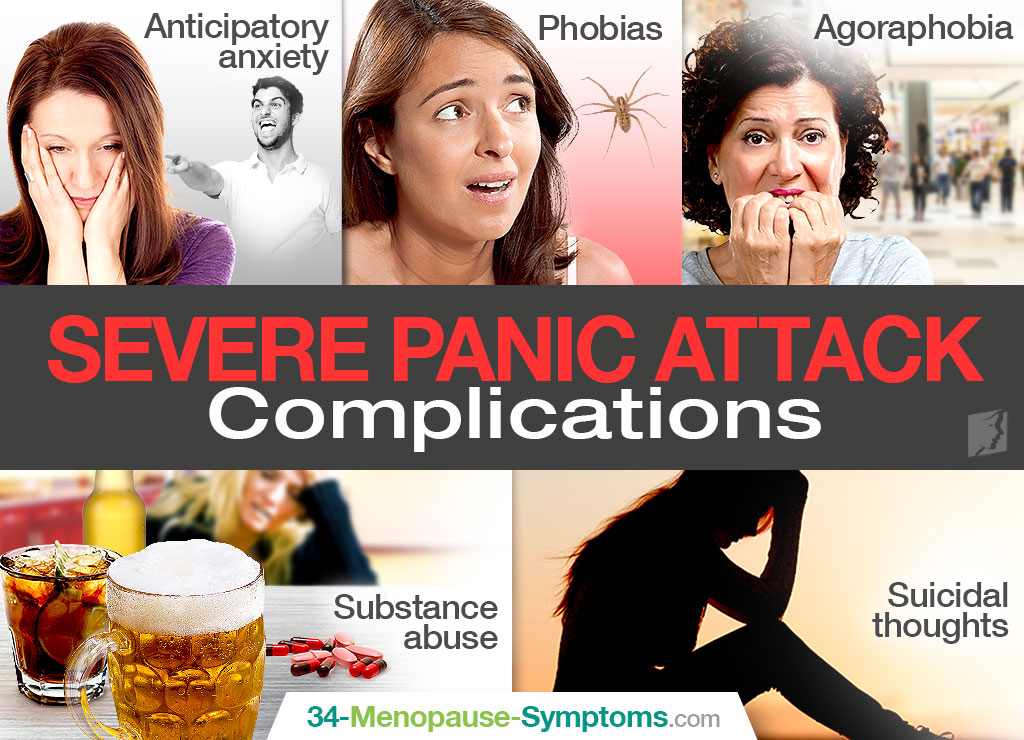A panic attack is difficult for menopausal women suffering from panic disorder, but when panic attacks become severe, they can significantly impair all aspects of their functioning from family bonds and social life to work environments. Untreated, they can have serious consequences on the health of the mind and body. Continue reading to learn the most important things to know about severe panic attack.
Severe Panic Attack Symptoms
The symptoms of a panic attack can vary in their severity and include any of the following:
Difficulty breathing or choking
Dizziness and headache
Tightness in the throat
Hyperventilation
Palpitations
Chest pain
Nausea
Excessive or unrealistic worrying
Sweating with hot or cold flashes
Shaking of the arms and legs
Tingling in the fingers of toes
Irritability and distress
Fear of dying
Severe Panic Attack: Complications
If panic attacks are left untreated, they tend to increase in frequency and severity and might result in serious complications, some of which include:
Anticipatory anxiety
Women are so disturbed by the previous panic attack that they develop an extreme anxiety and fear from the subsequent attacks. In severe cases, anticipatory anxiety can last for months and prevent women from living a normal life.
Phobias
They are irrational fears frequently develop in severe cases of panic attacks. They can be associated with numerous things, such places or objects, and prompts women to re-organize their life to avoid them.
Agoraphobia
It is an extreme fear from being in ordinary places or circumstances for fear of a panic attack. It starts with avoiding certain roads or stores, and as it progresses, this fear often forces women to limit their movement to “safe zones,” where they believe the attack will not happen and often makes them socially awkward or entirely isolated.
Substance abuse
It is quite common among menopausal women who suffer from panic attacks, especially if another mental health illnesses, such as depression, are also present.
Suicidal thoughts
They might start appearing in women's mind when severe panic attack and phobias become too overwhelming. Co-morbidity with depression is a known factor that often pushes women to try to hurt themselves.
When Should I Worry?
Panic attacks themselves are not harmful to your body. But because they can be easily confused with a heart attack, it is advisable to call the emergency medical services or have your family member drive you to the hospital, unless otherwise instructed by your doctor or a psychiatrist.
If you struggle with substance abuse or experience suicidal thoughts, ask your doctor right away to help you find a more effective treatment for your panic attacks. Help might also be available in your local community, such as a hospital, local health department, or a senior center. You can also call one of the free substance abuse or suicide helplines to talk to a trained specialist and find solutions together.
Panic disorder is a treatable mental health condition, so there is no need to suffer from severe panic attack and let them control your life. This is particularly true if you also struggle with other illnesses, such as depression, which might intensify the symptoms and complicate the recovery. Talk to your doctor about psychotherapy and medications, and consider some lifestyle changes. To start, check out the most common habits that can worsen panic disorder.
Sources
- American Family Physician. (1998). Panic Disorder: Diagnosis and Treatment in Primary Care. Retrieved September 18, 2017 from http://www.aafp.org/afp/1998/0515/p2328.html
- Anxiety and Depression Association of America. (n.d.). Panic Disorder. Retrieved September 18, 2017 from https://adaa.org/understanding-anxiety/panic-disorder
- Mind. (2015). Anxiety and panic attacks. Retrieved September 18, 2017 from https://www.mind.org.uk/information-support/types-of-mental-health-problems/anxiety-and-panic-attacks/
- National Institute of Mental Health. (2016). Panic Disorder: when fear overwhelms. Retrieved September 18, 2017 from https://www.nimh.nih.gov/health/publications/panic-disorder-when-fear-overwhelms/index.shtml
- National Health Service Choices. (2014). Panic disorder: complications. Retrieved September 18, 2017 from http://www.nhs.uk/Conditions/Panic-disorder/Pages/Complications.aspx



